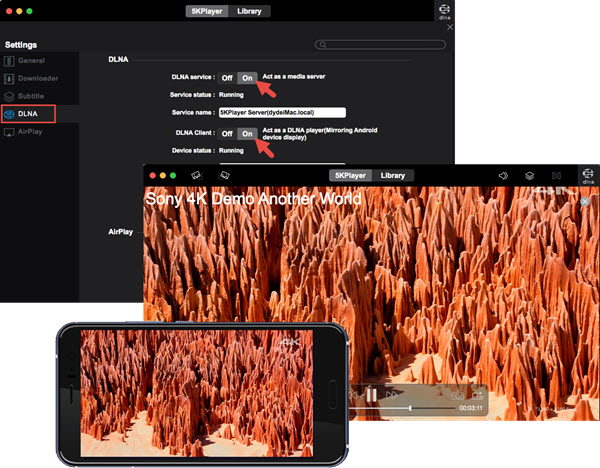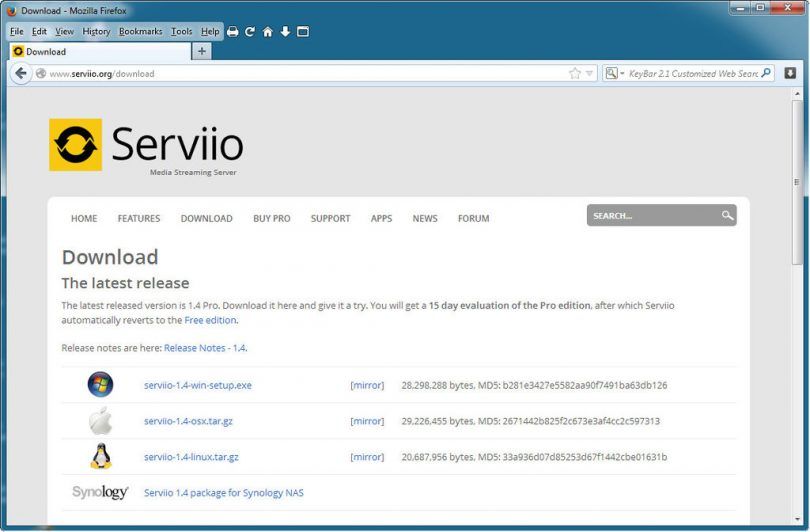Motivation
Looking for a simple DLNA server that I could just fire up in some directory, watch some files on my TV and then be done with it, I came up empty. There are some decent servers out there, like Serviio and friends, but none that fit my requirements. Also there wasn't really a decent enough and uncomplicated enough open source implementation that I could borrow. The Coherence python project seemed to be a good starting point, but was already to complex for what I was trying to achieve. Also, python dealing with Unicode paths on Windows pretty much sucks. Then there is Mono.UPnP, which didn't really work, and the Intel(?) Developer Tools for UPnP, which seemed kinda nice at first, but turned out to be coming straight out of over-engineering hell, in my humble opinion.
And so I decided to write my own server, borrowing some ideas from Coherence, reading some of the UPnP specs and reverse engineering the various protocols involved (yuck, SOAP :p) by watching my TV interact with Coherence and Serviio under Wireshark.
Elmedia Player is the top-rated solution for Mac that supports such wireless technologies as Chromecast, AirPlay and DLNA allowing you to quickly and easily stream media files from your computer to Smart TV or to any other AirPlay, Chromecast, and DLNA-compliant devices. Additionally to being a good DLNA player for Mac, Elmedia Player PRO is a universal downloader for saving various movies, videos, and audio files from YouTube, Dailymotion, Vevo and many more. When streaming files with Elmedia Player one can fully control the playback from the app: play/pause, skip forward and back, adjust the volume.
And since I was at it and this is supposed to be an educational and 'fun' project, I decided to do what you shouldn't normally do: Re-invent the wheel by writing my own small http server implementation insead of using the framework one.
Basic use
I’m running VLC v2.2.4 on my Mac (Sierra v10.12.4) and I have Media Server running on a Synology RS815+ (DSM v6.1.1) but I can’t see the DLNA service in the Local Network (UPnP) of the VLC interface! However, it can be seen by Windows clients on the Network. Can anyone help shed some light on this.
sdlna.exe/mono sdlna.exe
Serve videos from current directory and subdirectoriessdlna.exe -t image -t audio -v bytitle
Serve images and audio files from the current directory and subdirectories, organizing files by title.sdlna.exe -c cache.sqlite dir1 dir2
Serve videos from dir1 and dir2 (and subdirectories), storing meta data and thumbnails in the persistent cache storecache.sqlite.sdlna.exe --help
Display usage help.SimpleDLNA.exe
Or just use the WinForms GUI. (This probably won't work too well on non-Windows platforms ;)Your front-end hereFeel free to contribute something that works better for your preferred platform.
Also, you'll want to have a working ffmpeg binary somewhere within your $PATH, so that video thumbnailing and information gathering works.
Features
- Zero-config DLNA Server without persistent state (optional cache)
- Written in C# (See FAQ)
- Thumbnailing support for images and videos - if ffmpeg is found in the search path -, using any stream as input.
- Meta data as provided by TagLib#
- Serving of any and all file-system addressable files, incl. some views (transformations)
- Should be relatively easy to code up additional media sources, like podcasts
Non-Features, maybe TODO
- Media transcoding
- Although it should be easy enough to come up with something based on ffmpeg and the various freely available image libraries
- Full DLNA support - only browsing/playing supported at the moment
- Complete SSDP support. Because SSDP makes me cringe, I stopped after getting the basics working
- No Unit testing or test suite... Yeah, laziness is your enemy
- ...
Run requirements
- Some .Net 4 Client Profile compatible implementation to run the app
- Tested on .Net 4 and Fedora17 + mono, OSX Lion + mono
- File system and networking :p
- Some DLNA renderer (e.g. TV) to actually display the served media.
- Tested with: Samsung C-Series TV, Kinsky
External dependencies
The external dependencies are nuget managed and can be auto-restored (except for Sqlite maybe... Just reinstall it using nuget into the fsserver project).
Design
The thing wasn't formally designed, but more written as I went along. However, the individual components are only loosely coupled and interact through some real, generic interfaces that allow for extensibility.
Most of the IO is asynchronous, as per .Net Stream.BeginRead/.BeginWrite. No forking (D'OH), no explicit thread management.
The structure is as follows:
serverclass library - The actual core that implements an SSDP and HTTP serverSSDPServerimplementing the important bits of the SSDP-based multicast protocol as used by UPnP/DLNAHttpServerandHttpClient- Custom, stripped down HTTP/1.0 implementationHandlers- Request processing and response compositionResponses- Implementing an interface the HttpClient knows how to ship over the net.Views- Transformations of media trees- Some interfaces, types, enums, etc. to bring things together
fsserverclass library - Serving stuff from a file sytem. To be 'mounted' by theserver- Virtual folder/file trees the HTTPServer MediaMount will understand
thumbsclass library - Generating thumbnail pictures from arbriary stream sources- Image thumbnailer, using .Net System.Drawing
- Video thumbnailer, using ffmpeg via async pipes and the .Net Process API
sdlnaCLI application - Bringing the various pieces togetherSimpleDLNAGUI application - Alternative to the CLI and with persistent configuration. This thing is especially rough, as im not an UX guy.utilVarious low-level utility stuff
Contributing
Feel free to drop me pull requests. If you plan to implement something more than a few lines, then open the pull request early so that there aren't any nasty surprises later. Please try not to introduce too many new FXCop warnings. ;)
If you want to add something that will require some for of persistence incl. persistent configuration or API keys, etc., then open a pull request/issue especially early!

Mini FAQ
- Q: Does it work in my network/with my TV?
- A: At the moment, if you got a somewhat recent Samsung TV, then probably yes. Otherwise probably not. Why don't you just try?
- Q: This thing does not work with my setup?!
- A: Either provide me with the setup (i.e. buy me that TV) or whip out your debugger and Wireshark and read Contributing ;)
- Q: Are you planning to support Podcasts, RTMP streaming, insert name here?
- A: Maybe, but probably not. See Contributing
- Q: Why .Net and C#? I'm on Linux and/or Mac!
- A: Yeah, well... Other languages have their own set of problems. C# is reasonably portable, managed and garbage collected, statically typed and comes with a huge stdlib. And actually quite nice to use. If only it wasn't for Microsoft having invented this stuff and holding various patents...
Maybe I'll get bored and rewrite this stuff in C++11 or as a Firefox add-on in JavaScript :p
Thanks
To Microsoft, the UPnP(-AV) folks and Samsung and DLNA gurus for designing such a set of specs and protocols, that includes HTTP-alike over multicast UDP sockets, SOAP and XML, dozens of poorly documented namespaces used in SOAP responses, the contentFeatures.dlna.org HTTP header and other fancy tech. Also a big kudos to software engineers for messing up even the most basic things like http header field names are usually case insensitive or the Reason-Phrase of http status lines is purely informal.
Changelog
Here is some random information about DLNA open source projects:
- 5DLNA and UPnP libraries and middleware
UPnP media servers
Here is a list of UPnP media servers for Windows, Linux, MAC and Python:(some links obtained from http://ps3mods.blogspot.com/2007/05/upnp-media-servers-for-windows-mac.html)
I only list the open source ones.
- MediaGate (C++) - UPnP A/V Media Server, using cyberlink
- uShare (Linux) - UPnP A/V and DLNA Media Server, using libupnp
- GMediaServer (Linux) -
- MediaTomb (Linux, port to NAS has been reported)
- MythTV - MythTV UPnP A/V Media Server support
- Cidero Internet Radio Server (Java)
- Fuppes (Windows, Linux) - FUPPES is a free multiplatform UPnP (TM) A/V Media Server.
- PyMedS (Python) - Python UPnP Media Server
- OpenPFC - Media device engine
- John Gildred of Pioneer stated: Pioneer published an LGPL implementation of an HD DVR called Digital Library with support for DMS and DMP features. It uses the OpenPFC DTV middleware. It was never put through certification, and it's a bit outdated now.
UPnP Media Players
Dlna App
I only list the open source ones.
- Enna (Linux) - An embedded Media Center with GUPnP-based UPnP A/V Media Browser and Player capabilities
- XBMC (Linux | Windows | MacOSX) - A multi-platforms Media Center with UPnP A/V plugin
DLNA media servers
- uShare (Linux) - Free UPnP and DLNA Media Server for Linux
- Rygel - GNOME UPnP/DLNA Media Server
- minidlna (Linux) - DLNA server working whit Sony Bravia 46W4500
- MediaProvider - It's an Open Source project to provide media in your network including an DLNA media server
UPnP libraries and middleware
- Platinum - Platinum UPnP SDK
- libupnp - Linux SDK for UPnP Devices
- Originally donated by Intel, this library serves as the foundation for some other projects
- pupnp - A Portable Open Source UPnP Development Kit
- This looks like the successor to libupnp??
- cybergarage-upnp (Java) - Development package for UPnP applications
- mUPnP for C (C) - Development package for C UPnP applications
- mUPnP for C++ (C++) - Development package for C++ UPnP applications
- Net::UPnP (Perl) - Development package for Perl UPnP applications
- Cidero - Cidero UPnP Control Point and Bridge Software

DLNA and UPnP libraries and middleware
Dlna Client For Mac Os
- libdlna (C) - Reference DLNA open-source implementation for Linux
- coherence (Python) - DLNA/UPnP framework for existing applications
- Building bridges - coherence, a DLNA/UPnP framework talk, by Frank Scholz at ELCE 2008. Video available.
- GUPnP (C) - GObject/GLib based UPnP framework
Other lists
- There's also a good list of projects at: https://coherence.beebits.net/wiki/Resources